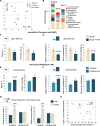Colitis-associated intestinal microbiota regulates brain glycine and host behavior in mice
- PMID: 36175462
- PMCID: PMC9522854
- DOI: 10.1038/s41598-022-19219-z
Colitis-associated intestinal microbiota regulates brain glycine and host behavior in mice
Abstract
Inflammatory bowel diseases (IBD) are chronic and relapsing inflammatory disorders of the gastrointestinal tract with complex etiology and no strategies for complete cure. IBD are often complicated by mental disorders like anxiety and depression, indicating substantial shifts in the microbiota gut-brain axis. However, the mechanisms connecting IBD to mental diseases are still under debate. Here we use Muc2 knockout mouse model of chronic colitis to uncouple the effects of the intestinal microbiota on host behavior from chronic inflammation in the gut. Muc2 knockout male mice exhibit high exploratory activity, reduced anxiety-related behaviors, impaired sensorimotor gating, and altered social preference towards males and females. Microbial transfer to wild-type mice via littermate co-housing shows that colitis-associated microbiota rather than inflammation per se defines behavioral features in Muc2 colitis model. Metagenomic profiling and combination of antibiotic treatments revealed that bacterial species Akkermansia muciniphila is associated with the behavioral phenotype in mutants, and that its intestinal abundance correlates with social preference towards males. Metabolomic analysis together with pharmacological inhibition of Gly and NMDA receptors helped us to determine that brain glycine is responsible for the behavioral phenotype in Muc2 mice. Blood and brain metabolic profiles suggest that microbiota-dependent changes in choline metabolism might be involved in regulation of central glycine neurotransmission. Taken together, our data demonstrates that colitis-associated microbiota controls anxiety, sensorimotor gating and social behavior via metabolic regulation of the brain glycinergic system, providing new venues to combat neurological complications of IBD.
© 2022. The Author(s).
Conflict of interest statement
The authors declare no competing interests.
Figures





Similar articles
-
Estrogen receptor β deficiency impairs gut microbiota: a possible mechanism of IBD-induced anxiety-like behavior.Microbiome. 2022 Sep 29;10(1):160. doi: 10.1186/s40168-022-01356-2. Microbiome. 2022. PMID: 36175956 Free PMC article.
-
A murine model of pediatric inflammatory bowel disease causes microbiota-gut-brain axis deficits in adulthood.Am J Physiol Gastrointest Liver Physiol. 2020 Sep 1;319(3):G361-G374. doi: 10.1152/ajpgi.00177.2020. Epub 2020 Jul 29. Am J Physiol Gastrointest Liver Physiol. 2020. PMID: 32726162 Free PMC article.
-
Akkermansia muciniphila Protects Against Psychological Disorder-Induced Gut Microbiota-Mediated Colonic Mucosal Barrier Damage and Aggravation of Colitis.Front Cell Infect Microbiol. 2021 Oct 14;11:723856. doi: 10.3389/fcimb.2021.723856. eCollection 2021. Front Cell Infect Microbiol. 2021. PMID: 34722332 Free PMC article.
-
The potential of Akkermansia muciniphila in inflammatory bowel disease.Appl Microbiol Biotechnol. 2021 Aug;105(14-15):5785-5794. doi: 10.1007/s00253-021-11453-1. Epub 2021 Jul 27. Appl Microbiol Biotechnol. 2021. PMID: 34312713 Review.
-
Review article: bugs, inflammation and mood-a microbiota-based approach to psychiatric symptoms in inflammatory bowel diseases.Aliment Pharmacol Ther. 2020 Jul;52(2):247-266. doi: 10.1111/apt.15787. Epub 2020 Jun 11. Aliment Pharmacol Ther. 2020. PMID: 32525605 Review.
Cited by
-
Baseline abundance of Akkermansia muciniphila and Bacteroides acidifaciens in a healthy state predicts inflammation associated tumorigenesis in the AOM/DSS mouse model.Sci Rep. 2025 Apr 10;15(1):12241. doi: 10.1038/s41598-025-96514-5. Sci Rep. 2025. PMID: 40210644 Free PMC article.
-
Underneath the Gut-Brain Axis in IBD-Evidence of the Non-Obvious.Int J Mol Sci. 2024 Nov 12;25(22):12125. doi: 10.3390/ijms252212125. Int J Mol Sci. 2024. PMID: 39596193 Free PMC article. Review.
-
Ginkgo biloba Extract Drives Gut Flora and Microbial Metabolism Variation in a Mouse Model of Alzheimer's Disease.Pharmaceutics. 2023 Dec 8;15(12):2746. doi: 10.3390/pharmaceutics15122746. Pharmaceutics. 2023. PMID: 38140087 Free PMC article.
-
Restoration of Lactobacillus johnsonii and Enterococcus faecalis Caused the Elimination of Tritrichomonas sp. in a Model of Antibiotic-Induced Dysbiosis.Int J Mol Sci. 2024 May 7;25(10):5090. doi: 10.3390/ijms25105090. Int J Mol Sci. 2024. PMID: 38791132 Free PMC article.
-
Quantitative Metabolomic Analysis of Changes in the Rat Blood Serum during Autophagy Modulation: A Focus on Accelerated Senescence.Int J Mol Sci. 2022 Oct 22;23(21):12720. doi: 10.3390/ijms232112720. Int J Mol Sci. 2022. PMID: 36361511 Free PMC article.
References
-
- Gasche C. Anemia in IBD: The overlooked villain. Inflamm. Bowel Dis. 2000;6:142–150. - PubMed
-
- Feagins LA, Souza RF, Spechler SJ. Carcinogenesis in IBD: Potential targets for the prevention of colorectal cancer. Nat. Rev. Gastroenterol. Hepatol. 2009;6:297–305. - PubMed
-
- Baumgart DC, Sandborn WJ. Inflammatory bowel disease: Clinical aspects and established and evolving therapies. Lancet. 2007;369:1641–1657. - PubMed
-
- Williams CN, Kocher K, Lander ES, Daly MJ, Rioux JD. Using a genome-wide scan and meta-analysis to identify a novel IBD locus and confirm previously identified IBD loci. Inflamm. Bowel Dis. 2002;8:375–381. - PubMed
Publication types
MeSH terms
Substances
LinkOut - more resources
Full Text Sources
Molecular Biology Databases
Miscellaneous

